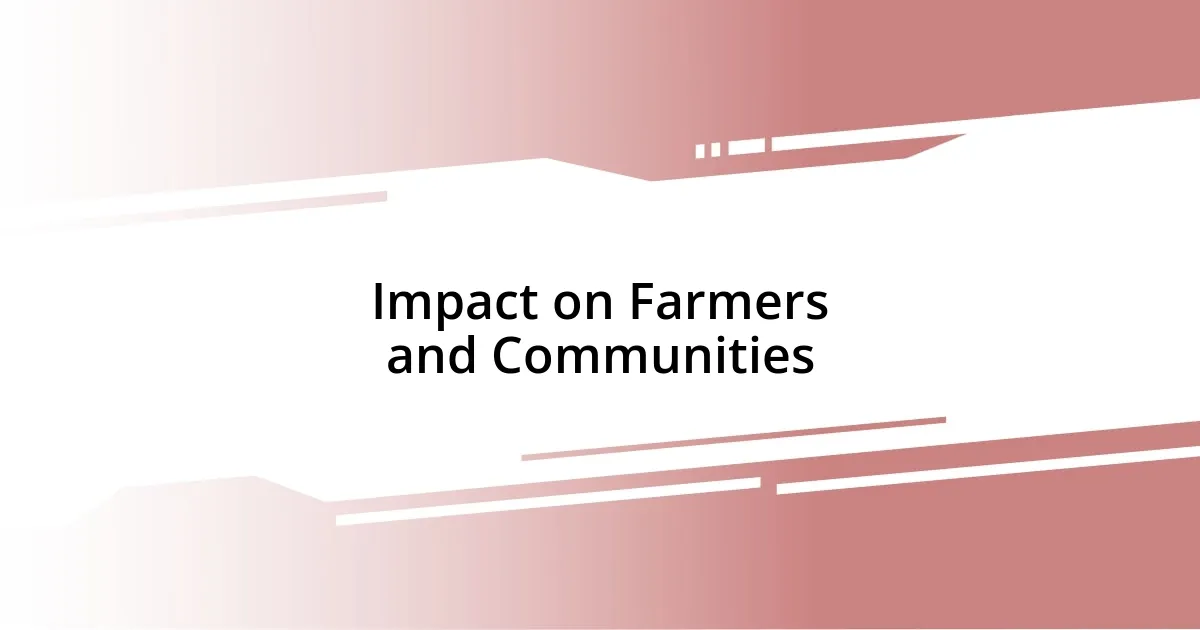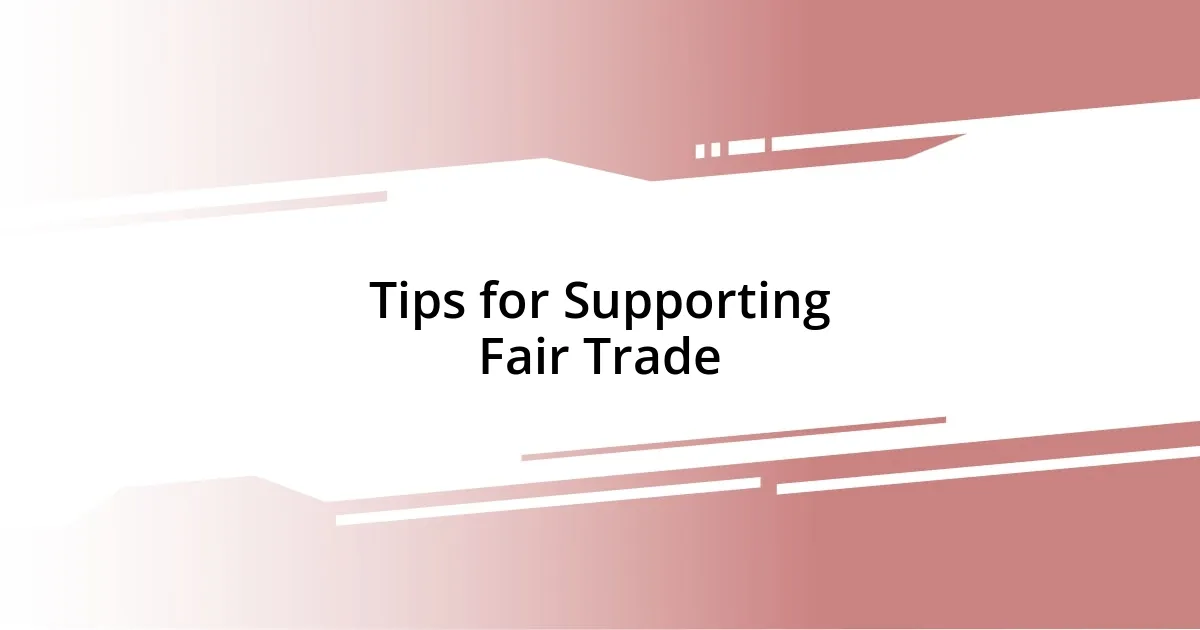Key takeaways:
- Fair trade chocolate ensures farmers receive fair wages and improve their quality of life through sustainable practices.
- Choosing fair trade fosters community empowerment, ethical consumerism, and environmental sustainability.
- Support for fair trade initiatives can lead to significant impacts, such as better education and healthcare access in farming communities.
- Informed purchasing choices can create a connection to the stories of resilience and hope behind fair trade products.

Understanding Fair Trade Chocolate
Fair trade chocolate is fascinating because it goes beyond just satisfying our sweet tooth; it represents a commitment to ethical and sustainable practices. I still remember the moment I unwrapped my first bar of fair trade chocolate. As I savored each bite, I felt an overwhelming sense of support for farmers. Have you ever thought about where your chocolate comes from and the sacrifice behind it?
The essence of fair trade is that it ensures farmers receive fair wages and work under safe conditions. Imagine working tirelessly in hot, humid fields, only to receive a tiny fraction of the chocolate’s retail price. The first time I learned about the struggles of cocoa farmers, it hit home for me. It made my chocolate indulgence feel more like a connection to a cause rather than just a treat.
In addition to fair wages, fair trade chocolate often emphasizes sustainable farming practices. I think about my own buying habits; choosing fair trade means that I’m also supporting environmental stewardship. Isn’t it comforting to know that, with every purchase, you’re contributing to a healthier planet? Understanding fair trade chocolate means recognizing the power of our choices and the difference they can make in the world.

Importance of Fair Trade Practices
The importance of fair trade practices cannot be overstated. Fair trade promotes economic stability for farmers in developing countries by guaranteeing them a minimum price for their crops. I recall my visit to a fair trade co-op where farmers shared stories of how fair trade had transformed their communities. It was incredible to see how a simple label on a chocolate bar could lead to better education and healthcare access for their children. Isn’t that astonishing?
Moreover, fair trade practices reinforce ethical consumerism. Each time I choose fair trade chocolate, I feel empowered, knowing that my purchasing decision supports a larger mission. Consider this: how many times have we mindlessly bought products without considering their impact? When I switched to fair trade, I felt more connected to the items I consumed. It turned into a rewarding experience rather than just a transaction.
This approach also incorporates environmental sustainability, ensuring that farming practices support the planet. I remember reading about the benefits of agroforestry in cocoa farming; it struck me that we could enjoy delicious chocolate while helping to combat climate change. Isn’t it inspiring to think that fair trade chocolate can be both a treat and a step toward ecological balance? This interplay between personal indulgence and global responsibility is what makes fair trade practices paramount.
| Aspect | Fair Trade Chocolate |
|---|---|
| Economic Impact | Provides stable wages and supports local communities |
| Ethical Consumption | Empowers consumers to make informed purchasing choices |
| Environmental Sustainability | Promotes eco-friendly farming practices |

Impact on Farmers and Communities
When I think about the impact of fair trade chocolate on farmers and communities, I’m reminded of a small farmer I met during my travels. He shared how, before fair trade, he struggled to provide for his family and send his children to school. It’s astounding to realize that fair trade initiatives not only give farmers a fair wage but also improve their quality of life, allowing them to invest in education and healthcare. This connection truly enriches my experience with fair trade chocolate, transforming it from mere indulgence into a catalyst for change.
Here are key aspects of the impact on farmers and communities:
– Economic Empowerment: Fair trade guarantees stable prices, lifting farmers out of poverty.
– Community Development: Funds from fair trade premiums are often reinvested into local projects, improving infrastructure and services.
– Health and Education: Access to better healthcare and educational opportunities boosts the overall welfare of families.
What really resonates with me is the sense of community that fair trade fosters. When I learned that these farmers collaborate to create cooperatives, it ignited a spark of hope in me. They support each other through shared knowledge and resources, cultivating a stronger bond. I can only imagine the pride they must feel when they see their efforts transforming their neighborhoods.
Each time I savor fair trade chocolate, I can’t help but feel a connection to these vibrant communities. It’s not just about chocolate; it’s about people coming together for a better future.
- Social cohesion: Farmers unite to form cooperatives that strengthen local ties.
- Empowerment of Women: Many fair trade programs focus on empowering women, leading to more equitable communities.
- Cultural Preservation: Supporting fair trade helps sustain unique farming traditions and local cultures.

Choosing Fair Trade Products
Choosing fair trade products is about more than just making a purchase; it’s about fostering connections. I still recall the moment I first chose a fair trade chocolate bar over a conventional one. It felt like I was taking a stand—not just for better ingredients, but for a whole community of farmers striving for a better life. Have you ever had that feeling? It makes every bite taste a little sweeter.
When I stroll through the aisles looking for fair trade options, I remind myself of the stories behind the labels. Each product tells a tale of resilience, ambition, and hope. I’ve found that when I choose to support fair trade, I’m participating in a larger movement aimed at creating real change. Isn’t it fulfilling to know that your choices can help uplift others?
It’s fascinating how these small decisions can lead to significant impacts. For instance, in my experience, purchasing fair trade chocolate means I’m indirectly supporting educational initiatives or health programs in farming communities. I can almost visualize those children whose futures are brightened because of my choice. Do you ever consider how small actions can lead to big transformations? Embracing fair trade means engaging in a global dialogue about sustainability and human rights with every sweet treat I savor.

Tips for Supporting Fair Trade
Supporting fair trade chocolate is simpler than you might think. One small step I took was to educate myself about the brands I loved. When I learned to look for the fair trade certification label, I felt empowered. Imagine knowing that your purchase is directly impacting farmers’ lives while also enjoying a delicious treat! It brings a sense of fulfillment that’s hard to replicate.
When hosting friends, I’ve started sharing the stories behind the chocolate I serve. Once, as we indulged in a fair trade dark chocolate tasting, I shared how those beans helped build schools in farmers’ villages. The conversation flowed, and suddenly everyone was engaged with each bar, appreciating not just the flavor but the change we were supporting. Isn’t it wonderful how food can connect us to stories and causes?
Another tip I find helpful is to encourage others to join the fair trade movement. I remember bringing a selection of fair trade goodies to my workplace for an office event. The curiosity it sparked was amazing! My colleagues began to ask questions about fair trade, and before I knew it, people were swapping recipes and sharing their own discoveries. How rewarding it is to think that just one conversation can plant seeds of awareness and inspire change beyond just my own choices!














